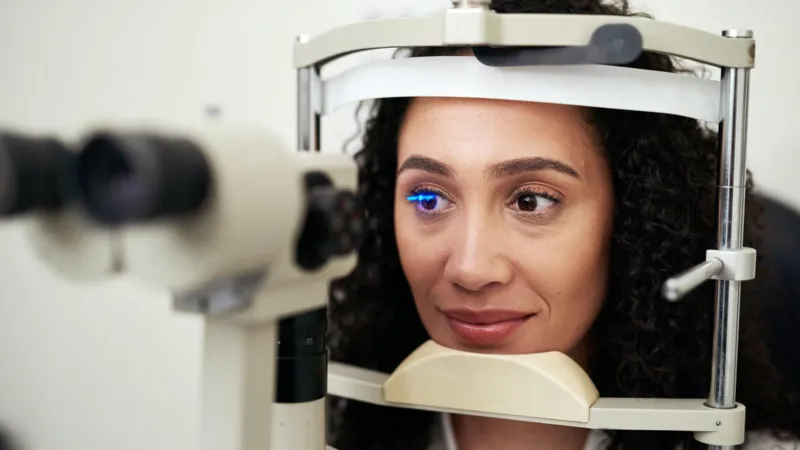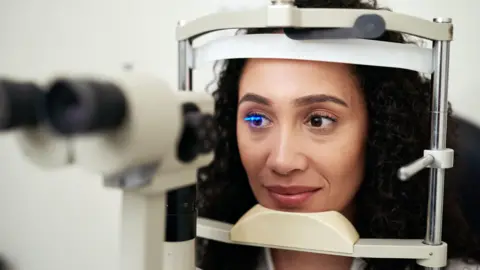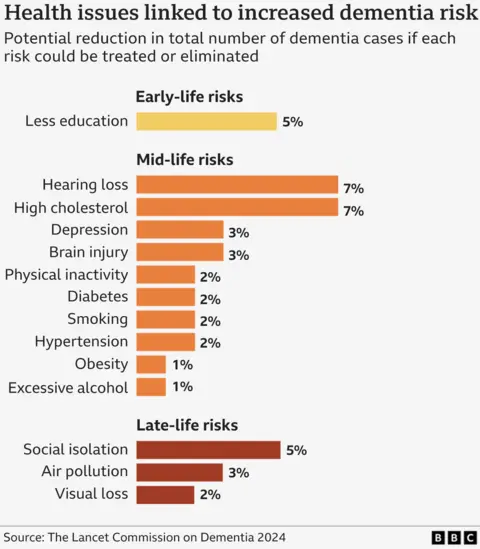Two new dementia risks identified by major report
Treating failing eyesight and high cholesterol can help lower the risk of the illness, a study suggests.

 Getty Images
Getty ImagesTreating failing eyesight and high cholesterol are two new ways to lower the risk of dementia developing, a major report suggests.
Scientists have now identified 14 health issues which, if reduced or eliminated, could theoretically prevent nearly half of dementias in the world.
Middle-aged people and poorer countries have most to gain from targeting these risk factors, says the Lancet Commission’s latest report on the topic.
It predicts that the number of people living with dementia could more than double to 153 million by 2050.
‘Never too late’

Dementia occurs when a disease, such as Alzheimer’s, damages nerve cells in the brain and leads to confusion and memory loss – but it is not an inevitable part of getting old.
Most of the reason why we get dementia is down to things we cannot control, such as the genes we inherit from our parents and grandparents.
But 45% of our risk can be changed, according to international experts in the field, and can therefore be reduced.
“It’s never too early or too late to take action,” says lead author Prof Gill Livingston, from University College London.
“Governments must reduce risk inequalities by making healthy lifestyles as achievable as possible for everyone.”
The researchers have drawn up a list of recommendations that countries around the world should focus on, including:
- making hearing aids accessible for those with hearing loss
- ensuring good-quality education for all
- supporting people to give up cigarettes
- encouraging exercise and sport
- reducing high blood pressure from the age of 40
- treating high cholesterol from mid-life
- treating obesity as early in life as possible
- reducing problem drinking
- making sure people are not socially isolated or lonely
- screening for eyesight problems and giving glasses to those who need them
- reducing people’s exposure to air pollution

Andy Watts, 58, from Berkshire, saw his father diagnosed with Alzheimer’s at the age of 64. He passed away at the age of 80.
“I watched my father slowly deteriorate over many years. In some ways you lose them before you actually lose them, because their personality gradually fades,” Andy says.
Watching it happen “rips your heart out”, he adds.
His family has a long family history of dementia and high cholesterol, so he gets checked regularly.
Andy said it is “motivating” to know there are things he and his family can do to try to minimise the risk of dementia, like focusing on diet and exercise.
“I want to do everything I can to reduce the risk,” he says.
‘More isolated’
Some factors are more of a risk than others, the report suggests.
For example, it estimates that hearing loss and high cholesterol are responsible for most cases of preventable dementia (7% each).
In early life it is lack of education that tips the balance while, in later life, social isolation and failing eyesight are a big risk.
Some experts are more cautious about what the evidence shows.
Prof Tara Spires-Jones, director of the Centre for Discovery Brain Sciences at the University of Edinburgh, said this type of research could not conclusively link any of these factors directly to dementia.
However, she said it would contribute to growing evidence that a healthy lifestyle “can boost brain resilience and prevent dementia”.
“We should be careful not to imply that people with dementia could have avoided it if they’d made different lifestyle choices,” said Prof Charles Marshall, from Queen Mary University London. He added that most of an individual’s risk of developing dementia is outside their control.
Samantha Benham-Hermetz, from Alzheimer’s Research UK, described the report’s findings as “groundbreaking”.
“Many people think of dementia as something that happens to people later in life, but dementia is not an inevitable part of ageing.”
 Getty Images
Getty ImagesSo how could vision loss be linked to dementia?
Scientists do not know exactly, but they say that in later life it could be down to the brain shrinking because it no longer needs to process certain aspects of vision.
Vision loss can also “restrict people’s lives, making them go out less, [be] more isolated and have fewer new experiences”, says Prof Livingston.
In many health systems, like the NHS, impaired vision can be treated. However, that is more of a problem in low-income countries which do not have the same resources.
There are reasons to be positive though – despite people living longer, there has been a reduction in dementia in high-income countries, which is thought to be because of lifestyle changes, such as fewer people smoking cigarettes.
However, rising life expectancy is driving up dementia cases in low-income countries.
“Twelve years ago you would have said there’s nothing you can do about dementia – but that’s really not the case,” says Prof Livingston.









